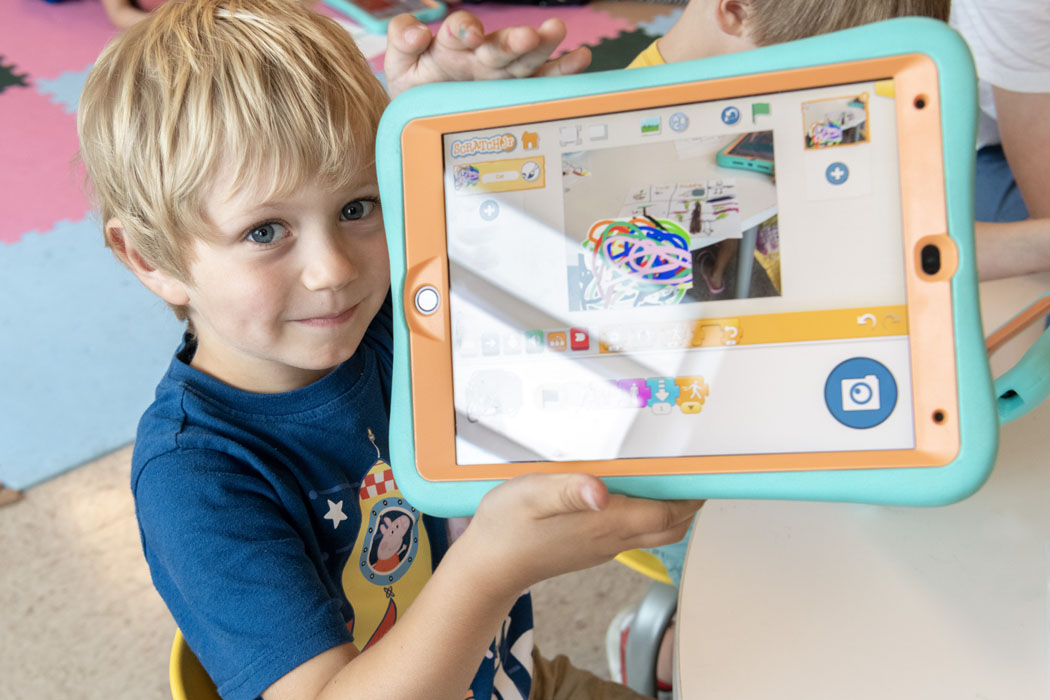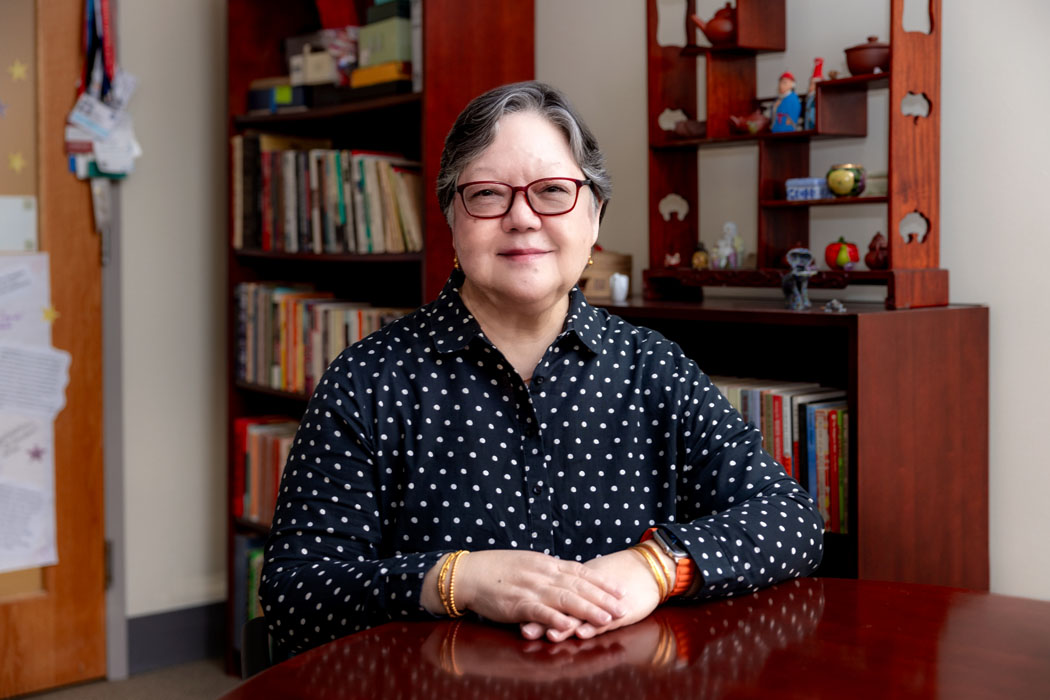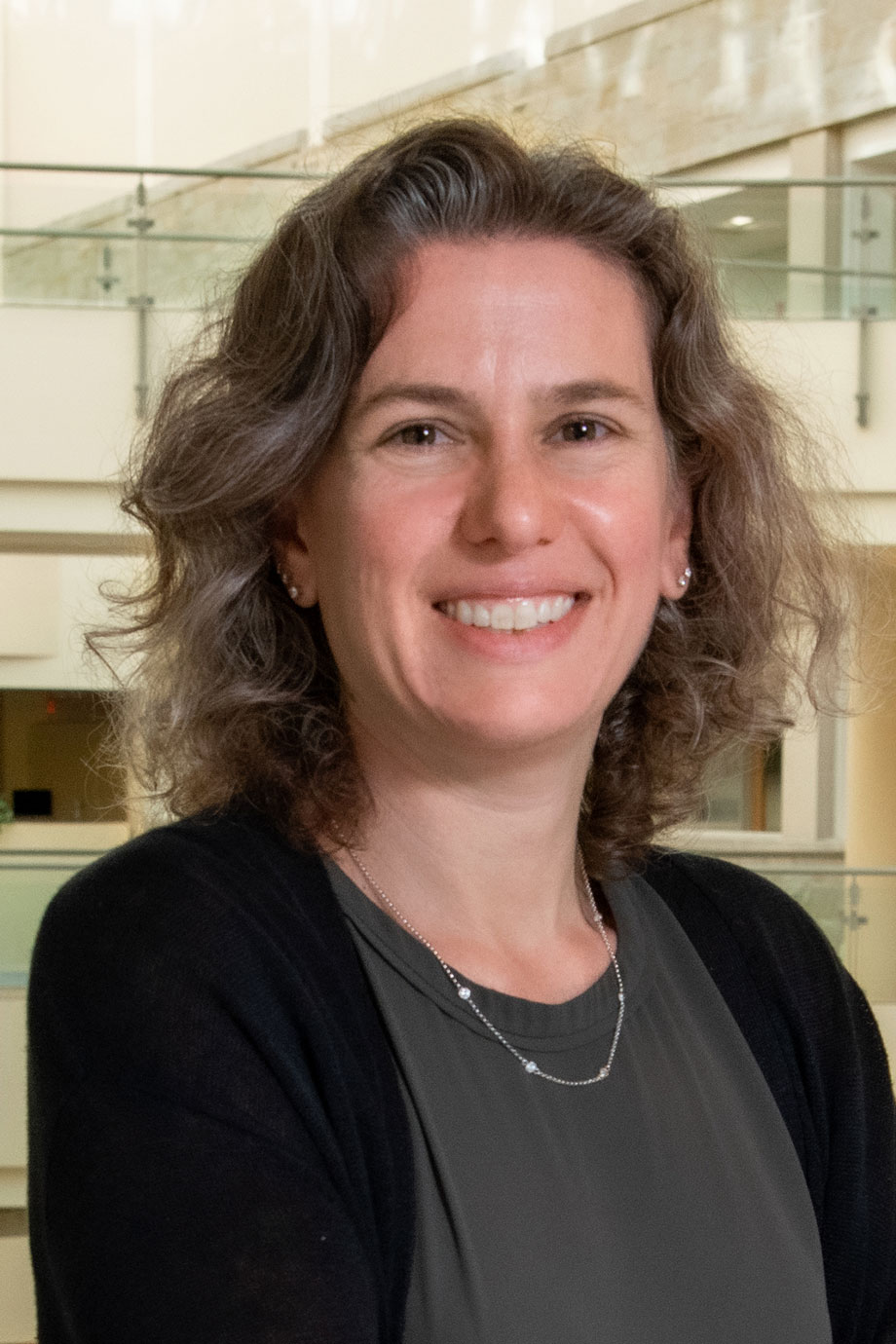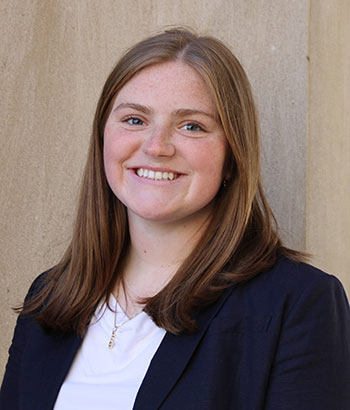
Rising in the U.S. News rankings
The Boston College Lynch School of Education and Human Development improved to 20th overall this year, a three-spot increase over last year’s U.S. News & World Report rankings. The school also had strong placements among specialty programs, with Student Counseling ranked ninth, Curriculum and Instruction ranked 13th, Elementary Education ranked 16th, and both Education Psychology and Education Policy ranked 20th.

NextGen STEMFest
The inaugural NextGen STEMFest, hosted by Professor Michael Barnett and his research team—in collaboration with Boston College’s Engineering Department—brought together more than 20 organizations, including the Boston College Hatchery, Boston Dynamics, and Thermo Fisher Scientific. The event highlighted the importance of community-based STEM research while celebrating 75 years of funding support from the National Science Foundation (NSF).

ScratchJr turns 10
The DevTech Research Group hosted a 10th birthday celebration for ScratchJr, an interactive learning platform (with more than 57 million users) designed to teach children coding. The party featured a Q&A session with founders Mitch Resnick and Augustus Long Professor of Education Marina Bers.
Lynch School expert shares insights on international student visas
Associate Professor Gerardo Blanco comments to WGBH about 17 current and former international students from Harvard and UMass whose visas were revoked in April: “The changes are unprecedented and represent a new breakdown in communication between the government and higher education.”
New Editor-in-Chief of the Journal of Studies in International Education
Gerardo Blanco, associate professor and academic director of the Center for International Higher Education at Boston College, was appointed Editor-in-Chief of the Journal of Studies in International Education (JSIE). His vision for the publication builds on its strong foundation while embracing new possibilities to advance scholarship in international higher education.
The implications of a Fulbright freeze
In the midst of federal budget cuts to the U.S. Department of Education, Gerardo Blanco and alumna Marisa Lally, Ph.D. ’24 (Higher Education), contributed an opinion piece about the Fulbright Program budget freeze in Times Higher Education. Their piece emphasizes the importance of the program, which they say has always been “bipartisan,” in fostering international academic exchange.
A “chilling” time in higher education
In University World News, Associate Professor Gerardo Blanco and alumnus Haishan (Sam) Yang, M.A. ’19 (Higher Education), write about the higher education climate, which they describe as “chilling.” Their opinion piece discusses international student visas, funding cuts, and campus free speech.
New research about intercollegiate, interdisciplinary, human-centered design
An interdisciplinary collegiate culture not only enhances the learning environment for students—it also contributes to the ongoing development of faculty, says new research by Associate Dean Julia DeVoy and colleagues, published in the International Journal of Engineering Education.

Lynch School Professor receives prestigious honor
Professor Shaun Dougherty was selected for the Presidential Early Career Award for Scientists and Engineers by the Institute of Education Sciences—the highest honor bestowed by the United States government on early-career scientists and engineers.
Dougherty leads the charge in bridging education and policy
The Heights, Boston College’s independent student newspaper, sat down with Professor Shaun Dougherty to discuss his appointment to the U.S. Department of Education.

Faculty Research Showcase explores housing policy and student homelessness
Professor Rebekah Levine Coley—who is also Director of the Center for Children and Family and the Gabelli Family Faculty Fellow at the Lynch School—and Assistant Professor Earl Edwards presented research on how housing policy and student homelessness impact educational equity at the Faculty Research Showcase.
The Future of Black Educators Summit
The inaugural Future of Black Educators Summit—co-hosted by Assistant Professor Earl Edwards, the Lynch School’s Institute for the Study of Race and Culture and Housing and Educational Equity Lab, and the Your Neighbor Foundation—included a keynote address and interactive workshops led by Boston College alumni Charles Grandson ’05, M.A. ’06 (Curriculum and Instruction), Ed.D. ’14 (Educational Leadership) and Dominique Williams ’14. The event was a platform for conversations on nurturing, empowering, and sustaining Black educators in American education.

Losing international students could devastate colleges
In The New York Times, two community members—Professor of the Practice Chris Glass and alumnus Xiaofeng Wan, M.A. ’13, Ed.D. ’24 (Higher Education)—shared their insights about the impacts of the Trump administration's policies on international students in higher education. “It’s an unprecedented situation that we’ve never seen before," says Wan.
Universities have a chance to lead in shaping AI’s future
"If universities are to lead in shaping AI’s future, they must boldly champion open collaboration, ethical governance, and knowledge-sharing that transcends ideological divides," says a Center for International Higher Education team, including Professor of the Practice Chris Glass and Lynch School doctoral students, in commentary for University World News.
An outstanding academic title
Choice, a publishing unit of the Association of College and Research Libraries, named Associate Professor Chris Higgins’ new book, Undeclared, to its 2024 Outstanding Academic Titles list. The list reflects “the best in academia, bringing with it the extraordinary recognition of the academic library community.”
Formative education takes center stage in the Lynch School’s newest department
Personal reflection and purpose-driven action are the hallmarks of formative education at the Lynch School. Dean Stanton Wortham and Associate Professor Chris Higgins spoke to LearningWell about the mission behind the Lynch School’s Department of Formative Education.

Centering inclusively designed digital curriculum materials
How can educators and policymakers ensure that students with reading disabilities, particularly those in K-12 settings, are provided with equitable access to inclusively designed digital curriculum materials? Associate Professor Richard Jackson shares his insights with Faculti.
Lynch School study finds a link between community at school and students’ well-being
Educators strive to support their students academically, socially, and emotionally. But when their students have parents who are struggling with depression, that task becomes more challenging. However, new research by Lindsay Lanteri, Ph.D. ’27 (Applied Developmental and Educational Psychology) and Professor and Gabelli Family Faculty Fellow Rebekah Levine Coley suggests that feeling connected at school could make a world of difference.

New research on adolescent behavioral and mental health published in Pediatrics
Over the past two decades, a far lower proportion of adolescents have engaged in high-risk behaviors like violence, substance use, and sexual activity. Explore the findings from research authored by Professor Rebekah Levine Coley and Lindsay Lanteri, Ph.D. ’27, published online in Pediatrics.

The building blocks of math that students need to excel—but aren’t always getting
How does income influence childrens’ number sense and problem-solving skills when learning math? Associate Professor Elida Laski’s research, featured in The Hechinger Report, reveals that higher-income students use more advanced problem-solving strategies than their lower-income peers.

Professor A. Lin Goodwin joins the National Academy of Education
Thomas More Brennan Professor A. Lin Goodwin is one of 22 education leaders and scholars who has been elected to the National Academy of Education—a prestigious organization that advances high-quality research to improve education policy and practice.
Fostering a sense of purpose
Professor and Ascione Faculty Formation Fellow Belle Liang is leading the charge for students, faculty, and staff to find purpose and belonging at Boston College. Committed to empowering others to find their true calling by collaborating with student and academic affairs and the Division of Mission and Ministry, Liang uses her research to promote formative education across campus. Read more in The Heights.

From connection to crisis
How worried should we be about the impact of social media on today’s young people? To answer that question, the Boston College Magazine podcast featured Associate Dean of Faculty & Academic Affairs, Ana Martínez-Alemán, who discussed her timely research on mental health in the digital age.
Building a path to healing from trauma
After discovering her passion for trauma counseling as a Lynch School master’s student, Rebecca Nelson ’14, M.A. ’16, empowers clients on their journey toward healing and recovery in her own private practice.
The evolution of Black student enrollment in higher education
Associate Professor Raquel Muñiz, highlighted in The Heights, delved into the evolving landscape of Black student enrollment in higher education, focusing on how Supreme Court cases have impacted students of color on college campuses. Drawing on her legal expertise, Muñiz advocated for intentional efforts to increase diversity.

Prof. Katherine McNeill named 2025 NARST Fellow
The honor of becoming a 2025 NARST Fellow—a mid-career award presented by the National Association for Research in Science Teaching (NARST)—celebrated Professor and Bryk Faculty Fellow Katherine McNeill’s transformative contributions to K–12 science teaching and learning.
International collaboration drives inclusivity
Trinity College Dublin hosted Professor Martin Scanlan for a conversation about his research on inclusive schools. He discussed the importance of recognizing and addressing exclusionary barriers in schools and developing a comprehensive approach to social justice, highlighting the relationship between schools and families as crucial to building inclusive environments.

A roadmap for equity-focused schools
How can schools empower the next generation to recognize and challenge injustices? A new book co-authored by Professor Scott Seider, alumna Julia Bott ’02, M.Ed. ’07, Ed.D. ’24 (Educational Leadership), and Harvard Lecturer Aaliyah El-Amin, offers a powerful roadmap.
Featured Lynch School speaker at Harvard Divinity School
Joining a panel of esteemed scholars at Harvard Divinity School, David S. Nelson Chair and Associate Dean for Research, Brian K. Smith, discussed the complex intersection and ethical implications of artificial intelligence in religion.
Promoting diversity in psychoanalytic research
Professors Usha Tummala-Narra and Michael Russell are now members of the Holmes Commission on Racial Equality in American Psychoanalysis. Their work, recognized by Division 39 of the American Psychological Association, was honored with the Diversity Award for outstanding contributions to advancing diversity in psychoanalytic research.

Dean Wortham weighs in on Boston College’s next leader
Dean Stanton Wortham emphasized the compassionate approach of Rev. John T. “Jack” Butler—Boston College’s next president—in supporting both students and faculty holistically, in comments about BC’s new leadership to The Heights.

The future of education and human development
Faculty at the Lynch School of Education and Human Development are exploring innovations and trends in their fields. From advancements in technology to evolving teaching methods and shifts in funding models, our faculty shared their insights on the transformative changes shaping the field.
Improving mental health on college campuses in India
First-year Lynch School graduate student, Aayushi Shah, M.A. ’26 (Mental Health Counseling) is changing the game for mental health support in India with her company, Adapt Wellness. Shah connects individuals with licensed mental health professionals based on their needs, budget, and the level of expertise they’re looking for—all through an intuitive app.
Cami Kulbieda ’26 leads change for LSEHD students
The Undergraduate Government of Boston College (UGBC) and the Division of Student Affairs launched a new initiative to provide free Charlie Cards to Lynch School and Connell School of Nursing students facing high financial need for their practicum and clinical experiences. The program, spearheaded by Cami Kulbieda '26 (Elementary Education and Applied Psychology), UGBC’s academic affairs committee chair, aims to ensure that all students have access to essential learning opportunities without financial stress.
Lynch School student elected to serve as the next UGBC president
Cami Kulbieda ’26, is the 2025-26 UGBC president, coming out on top in a three-ticket election. “I cannot express enough how much I appreciate all that this community has given me in my three years here, and am committed to make the strongest impact I can with the time I have left,” Kulbieda reflected in an interview with The Heights.
Alumna named President of the Century Foundation
Julie Margetta Morgan, who holds both a Ph.D. in Higher Education from the Lynch School and a J.D. from the Boston College Law School, will lead the next chapter at The Century Foundation, a leading progressive think tank, as the organization’s eighth president.
![[LSEHD] AERA-Hero - 2](/content/dam/bc1/schools/lsoe/LSOE%20News/2025/aera-2025/Lillie-Albert-Kyunghoon-Son-2.jpg)
Highlights from AERA 2025
Faculty members and doctoral students shared groundbreaking research on equity, language, and educational outcomes at one of the field’s most prominent national education conferences. The American Educational Research Association (AERA)’s 2025 conference in Denver, CO, included presentations from more than 90 Lynch School representatives.
Leading the important work of the Maura Wilkins Foundation
The Maura Wilkins Foundation, established and supported by Boston College alumni, is dedicated to raising funds and awareness for alcohol and substance abuse treatment. Led by Executive Director Maribeth McKenzie MacDonald, M.A. ’94 (Curriculum and Instruction), the foundation focuses on providing support programs to aid individuals on their recovery journey.

A senior to remember
“Living, learning, and leading at BC taught me that my purpose in life is to be the woman people know they can turn to,” said Meghan Heckelman ’25 (Applied Psychology), in reflections about her time as an Eagle on the eve of graduation. The impressive senior marked her time at BC with leadership positions, including as President of the Undergraduate Government of Boston College (UGBC).
Outstanding, noteworthy, and impactful for the field
Lynch School alum Michael Di Bianca, Ph.D. ’24 (Counseling Psychology), alongside Professor Jim Mahalik, published research that was recognized by the American Psychological Association as an Editor's Choice for being “outstanding, noteworthy, and impactful for the field.” Their paper describes developing the Relationships Fostering Healthy Masculinities Scale, which reveals whether a man’s sense of masculinity is influenced by their relationships in a productive way or a way that perpetuates an unhealthy understanding of masculinity.

Undergraduate students head to Iceland for service learning on spring break
For the second year, the Lynch School partnered with Compass Path to bring 30 undergraduate students on a life-changing service trip to Iceland. The students worked to provide meals, shelter, and care to refugee families and participated in shoreline clean-up, recycling, and sustainability work.
Lynch School undergrads share research at the AAC&U STEM Higher Ed Conference
Lynch School student Pablo Colón Quiñones ’26 (Applied Psychology) and the Carroll School’s Carrie Kandall ’25 presented at the AAC&U 2024 STEM Higher Ed Conference, sharing "Aftermath: Fast Fashion Fixer," a board game prototype from the Aftermath Learning Lab. The presentation was based on prior research led by Associate Dean Julia DeVoy, with contributions from alums Cecelia Cheng ’23 (Applied Psychology), Jackie Alicea ’25 (Elementary Education and Applied Psychology) and Addie Metzger ’24 (Secondary Education).